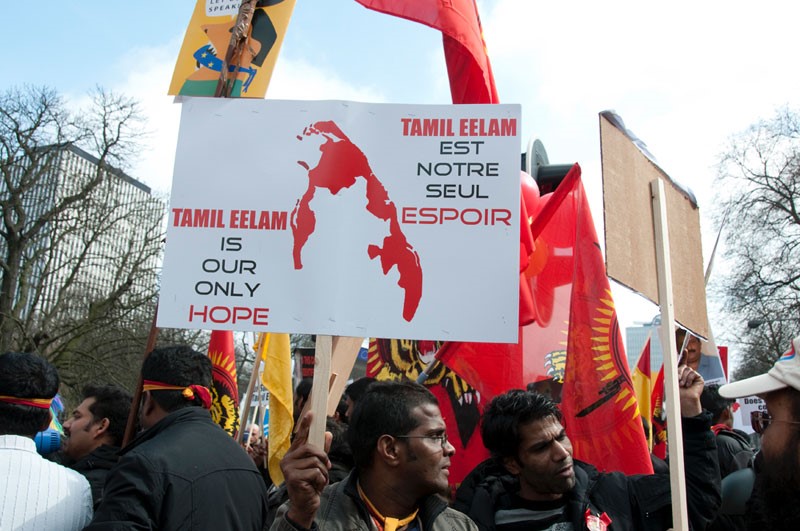Sri Lanka: Toward a Diaspora Re-Engagement Plan
Posted on July 7th, 2015
By Asanga Abeyagoonasekera
There is an unofficial leader of the opposition. What we have is confusion; there are MPs of the same party in government as well as in the opposition.”Anura Kumara Dissanayaka, JVP Leader
With the parliament of Sri Lanka in a state of dissolution and elections looming ahead, the costs confronting the nation remain high. Rupees 3 billion was spent on the last election, and 4 billion on the upcoming election, according to the election commissioner. It is hoped that the return on investment for the people’s money will be worth the exorbitant spend. Colossal expenditure in the name of statecraft should help reap rich benefits, and the country awaits the promised gains. Now, the priority is to elect the best representative for the next few years in parliament.
In the name of regime change and developmental politics, the country faced a large scale re-shuffling of roles in the public service with strategic points in the nation’s administration being vacated overnight. Will August see a repeat of January’s changes? If so, the year 2015 will be marked as the year wasted. It is hoped that the same old actors do not emerge in the political arena: small nations such as Sri Lanka cannot afford years fallen to this kind of politics.
As a fulfilment of the LLRC recommendation, the Foreign Minister held discussions with the Global Tamil Forum (GTF) in London. The direct engagement with these groups (some former sympathisers of the LTTE) ensures multi-faceted debate. While some see engagement with the GTF as a positive step others brand it illegal. GTF and many other diaspora organisations supported the ideology of LTTE and were therefore deemed terrorist fronts by the previous government through a gazette notification. Under UN Security Council Resolution 1373, 15 LTTE fronts were proscribed with effect from 1 April 2014.
Recently, Suren Surendran and GTF requested a review of the list of organisations and individuals proscribed in a gazette notification and proposed a four-pillar strategy. If the government take them off the list, this would have a serious impact on the re-engagement process with the diaspora. It may open the door towards greater reconciliation. On the other hand, it may also risk strengthening the LTTE set-up and cause its re-emergence. How does the government decide whom to talk to and whom not to? Are the listed organisations willing to drop the LTTE ideology of a separate state?
Of local parliamentary opposition to the government’s actions, the opposition raised the all-important question as to how the Foreign Minster could engage in such talks without prior approval from the cabinet, President, or without informing parliament. It was further noted that it is illegal to engage in discussions with an organisation listed as ‘terrorist’. MP Vasudeva Nanayakkara said, They should first give up the Eelam objective and declare that they are not aligned to the LTTE anymore.” MP Prof. G.L. Peiris said that post war stability was at stake due to the government’s failure to take tangible measures to counter the threat posed by the LTTE rump. According to Ven. Sobitha Thero this is a positive step to re-engage with GTF.
Given the opposition’s response, it is important to reach consensus to introduce solutions to bridge the gap between the Sri Lankan diaspora with those residing in Sri Lanka. What should be the way forward? First, Eelam ideology should be fully given up and without any further engagement with and support to the LTTE. Following this, the reconciliation process should engaged in with the genuine intention both sides to commit to it sincerely. Finally, after this, a review of the list could be considered. It was Suren Surendran who defended the LTTE recruitment of child soldiers and accused the Sri Lankan military for using cluster bombs in his interview with Al Jazeera in 2009 (https://www.youtube.com/watch?v=LMX2NjyJ1oQ). The process to engage with a person who defended the LTTE’s position will take time, and therefore, a step-by-step method rather than a one-off process should be looked at. A process that includes the engagement of all stakeholders – not only the government but also civil society NGOs. An organisation such as Interpeace could be looked at to facilitate and assist the process, rather than involving nations with a significant diaspora population. It is important to learn from countries that have worked on reconciliation such as South Africa, Rwanda and others. Sri Lanka should also develop its own process, joint discussions such as the South Africa-Sri Lanka joint seminar conducted last year on reconciliation with renowned thought leaders who engaged within their own countries is important.
The Diaspora Festival was proposed by the Foreign Ministry as a means to re-connect with their place of origin. A comprehensive diaspora re-engagement plan should be prepared by the Foreign Ministry and presented to the parliament. Rather than taking ad hoc measures, a systematic approach to engaging with these groups is necessary. The engagement plan could have recommendations such as to assign diaspora officers at embassies to engage with the disconnected diaspora, gather information, and attend to their requests. Many more useful ideas could be looked at and included in this document which should be compiled with inputs from all stakeholders including the opposition members of parliament, all political parties, and the general public.
(This article was first published by the Institute of Peace and Conflict Studies, New Delhi at
http://www.ipcs.org/article/south-asia/sri-lanka-toward-a-diaspora-re-engagement-plan-4896.html)
